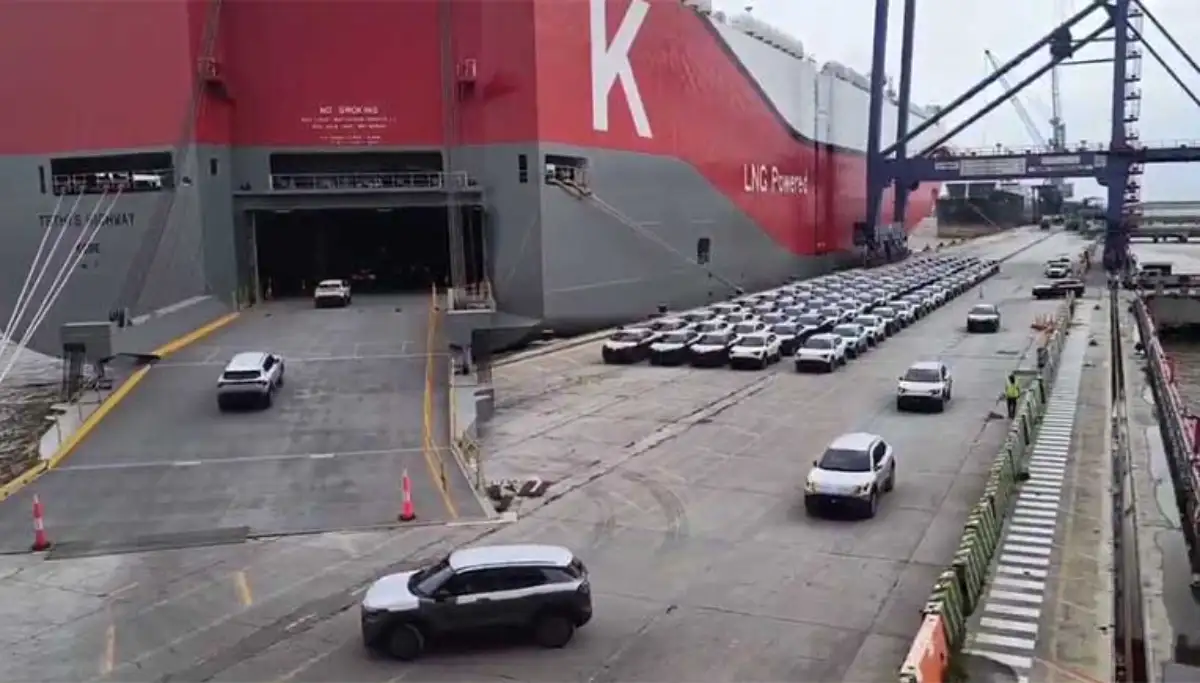Maruti Begins Export of e-Vitara from Gujarat’s Pipavav Port to Europe: Big Boost for Indian EV Industry

Maruti Suzuki Makes Historic Move with e-Vitara Exports
In a landmark development for India’s automobile industry, Maruti Suzuki has officially started exporting its all-electric SUV, the e-Vitara, from Pipavav Port in Gujarat to Europe. This marks one of the biggest milestones in India’s EV journey, as Maruti enters the highly competitive European market with its electric vehicle offering. The first consignment of e-Vitaras has been shipped to the UK, Germany, Norway, France, Denmark, and several other European countries, highlighting India’s growing role as a global automotive exporter. This move is not just about shipping vehicles but about showcasing India’s ability to deliver world-class EVs that meet international safety and emission standards. For Maruti Suzuki, this step represents a turning point where the brand transitions from being primarily a domestic leader to becoming a global EV competitor. For India, it strengthens the country’s position as a rising hub for electric vehicle manufacturing and exports.
Why Europe Matters for Maruti Suzuki’s e-Vitara Launch
The European market has long been seen as the ultimate test ground for new electric vehicles, thanks to its strict emission norms, advanced infrastructure, and eco-conscious customer base. By choosing Europe as the first export destination for the e-Vitara, Maruti Suzuki is signaling its confidence in the product’s quality, safety, and performance. Countries like Norway and Germany are at the forefront of EV adoption, while markets like France and the UK are offering attractive incentives to EV buyers. This creates the perfect opportunity for Maruti to penetrate markets that are already open to switching from conventional cars to sustainable alternatives. Furthermore, Europe’s EV infrastructure is far more advanced than India’s, allowing the e-Vitara to be tested, reviewed, and accepted on a global stage. Success in Europe would also mean that Maruti Suzuki can leverage its reputation to enter other EV-friendly markets like North America, Japan, and Southeast Asia.
Pipavav Port Becomes a Key Gateway for EV Exports
The choice of Pipavav Port in Gujarat for exporting the e-Vitara is strategic and symbolic. Pipavav has been developing into one of India’s most important automotive export hubs, with modern infrastructure, logistics efficiency, and close connectivity to Maruti Suzuki’s manufacturing plants in Gujarat. Exporting from Pipavav not only reduces costs but also streamlines the supply chain, enabling Maruti to ship large consignments faster and more reliably. Industry insiders note that Gujarat is rapidly becoming the “Detroit of India” for EVs, with multiple companies setting up production and export facilities. By exporting from Pipavav, Maruti is also supporting regional economic growth, creating jobs, and boosting India’s reputation as a global EV exporter. This will encourage other Indian automakers to follow suit and make Gujarat a central hub for electric mobility exports. It shows how India’s ports are no longer just trade gateways but launchpads for high-tech, future-ready vehicles.
The e-Vitara: Features Designed for Global Appeal
The Maruti Suzuki e-Vitara is not just another electric SUV; it has been carefully designed to meet both Indian and international expectations. Reports suggest that the e-Vitara comes with a 400+ km range on a single charge, fast-charging capability that can juice up the battery to 80% in under 45 minutes, and advanced Level 2 ADAS safety features. The SUV also offers a modern design with aerodynamic styling, LED lighting, and premium interiors featuring a large touchscreen infotainment system with Android Auto and Apple CarPlay support. In addition, Maruti has focused on sustainability by using eco-friendly materials in the interiors and ensuring that the vehicle complies with Europe’s stringent emission and recycling standards. The fact that the e-Vitara is being accepted in countries like Germany and Norway—where customers demand the best in EV innovation—speaks volumes about Maruti’s engineering capabilities and global ambitions.
Impact on Indian EV Market and Future Prospects
Maruti Suzuki’s decision to export the e-Vitara to Europe has a two-fold impact: it strengthens India’s position in the global EV landscape while also boosting confidence in the domestic EV ecosystem. For Indian consumers, this global acceptance sends a strong message that Made in India EVs can meet the highest international standards. This could further accelerate EV adoption in India, as customers see more value and trust in locally produced vehicles. Moreover, this move pressures other Indian automakers to enhance their EV offerings and compete not only in domestic markets but also globally. Analysts predict that if the e-Vitara performs well in Europe, Maruti Suzuki could expand its export destinations to include North America and Southeast Asia, while also introducing more affordable EV models for the Indian market. This export milestone is therefore not just about sales but about shaping India’s identity as a global leader in electric mobility.
Conclusion: A Golden Era for India’s EV Exports Begins
With the export of the e-Vitara from Pipavav Port to Europe, Maruti Suzuki has opened a new chapter in India’s automotive history. This move represents much more than just selling cars overseas—it highlights India’s ability to innovate, manufacture, and compete in one of the most advanced EV markets in the world. The combination of affordable pricing, advanced features, and sustainable design makes the e-Vitara a strong contender in Europe’s EV landscape. For Indian buyers, this also builds confidence that world-class EVs can be designed and built in their own country. As Maruti Suzuki continues its journey into global EV exports, the success of the e-Vitara could mark the beginning of a golden era for India as a true powerhouse in the global electric vehicle revolution.